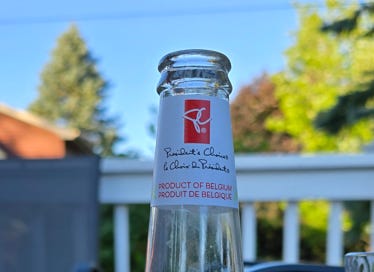It is inevitable that we will have to talk more and more about interprovincial trade. It’s mostly been completely off the radar for economic developers. But if our goal is to deliberately encourage more trade within the country via government policy, an equal effort should be made to assess what sectors are at risk (and what, if anything, can be done) and what sectors have opportunity (and what, if anything, can be done to encourage more exports).
If you talk to a lot of local companies in New Brunswick they will grumble that not only is there not a home team bias - it is the opposite - for a product or service to be good it has to come from outside the province.
I use the example of President’s Choice as one example. They have an apple cider product that they proudly promote as “Product of Belgium” - right up front - not hidden away in the small print. Why? Because the “Product of Belgium” is the point - Loblaws thinks branding it as from Belgium will get people to pay the premium price.
How about using Belliveau Orchard’s exact same product? I guess “Product of New Brunswick” doesn’t sound exotic enough.
Of course this is not an interprovincial trade example per se (although it really is - why shouldn’t our big national grocers be front and centre in the effort to strengthen the national economy), it is an example at the country level of the home team anti-bias (if you work for Loblaws I don’t want a stream of PC products from Canada, I’m only using this for illustrative purposes).
I have had an increasing number of professional services firms in New Brunswick tell me they are losing RFPs to companies from outside the province even when the bids are financially competitive (or even cheaper). Even I have been caught up in this recently.
The information technology (IT) services industry is an example:
All is fair in love and war (and RFPs) but when certain jurisdictions (e.g. Quebec and Ontario) would prefer local companies over those from outside and other jurisdictions (e.g. New Brunswick) seem to prefer companies from outside over local companies, it’s worth at least putting on the table for discussion.
When talking about ‘freer’ trade - it usually means eliminating tariffs and non-tariff barriers (e.g. reciprocity agreements) but it is hard to eliminate a cultural bias.
If you are of the view that New Brunswick exports its best potatoes and lobsters leaving the dregs for locals or of the view that a local professional services firm (e.g IT services, consulting, accounting, marketing services) could not possibly be as good as a razzle dazzle firm from the Big Smoke, that’s a cultural bias and not one easily overcome.
I’m not even sure what kind of remedy to suggest here. I don’t want to coddle local unproductive and uncompetitive firms and industries but I also don’t want great local companies passed over because of some kind of intangible bias.
One thing is for sure. I hope economic developers are talking about this.





We in NB IT have been told by many outsiders that we have some of the smartest, hardest working, insightful and innovative talent they have seen anywhere. We are too humble and modest and we lack the sales and marketing focus and investment that others use to get in the door at the party. Once we are in we are the life of the party but getting in (including in our own neighbourhood) is a big challenge. I can charge double + hourly rates for advisory work outside Atlantic (and buyers don’t even blink) than I do inside (and there’s always the “well the CEO doesn’t even make that” kind of questions. We need to play bigger, be more confident, and stick our foot in the door more (because we have the chops for sure).
Good issue for discussion David and I agree with your comments and those of Glen Hicks. I think there are two distinct issues of bias: one for goods and one for services. Re: services like consulting I believe the bias for expertise from away (over 100 miles as the joke goes) is rooted in the belief that services from away have a wider geographic base of experience that they bring to work done here in NB ie they may bring in new ideas that a local firm may not have because their work is focused on local/regional work. With respect to goods like food/groceries the problem is access. I have seen the big player (Loblaws and Sobeys) do major in store promotion of “local” products on their shelves despite local being 0.0001 % of their total offering. This is designed to portray these companies as supporting the loacal community/farmers and thus being good corporate citizens. At best this is window dressing and at worse it is a distraction from the corporate concentration that the Feds/ Competition board allowed which has lead to very profitable chains controlling prices (they were caught fixing bread prices) and local access to shelf space. When over 80% of our food is purchased at these “one stop” chain megastores people are not going to drive all over town to buy local - a waste of valuable time and gas. Under these conditions local food producers are always going to struggle because of the rigid supply chain structure not because of difficulty in being competitive in quality or price.